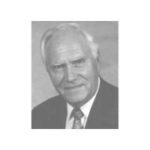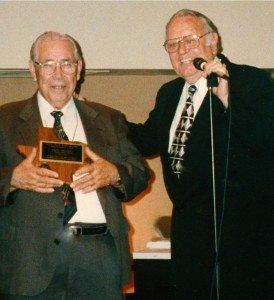 When the Stamps Quartet began their live radio program on KRLD out of Dallas, Texas, there was a famously recognized piano arpeggio that started every show: Marion Snider rolled an ascending F7 chord that introduced “Give The World A Smile”! That opening signature song was heard all across the country for many years as southern style gospel quartet music was growing in popularity. Marion had established himself as a talented pianist in his teens and following those early days with several of the Stamps-Baxter groups in the 40’s and 50’s he continued to work with a number of nationally known quartets. He also performed with his own group on a Sunday morning television program in Dallas and has been a strong supporter and promoter of southern gospel music for his entire life.
When the Stamps Quartet began their live radio program on KRLD out of Dallas, Texas, there was a famously recognized piano arpeggio that started every show: Marion Snider rolled an ascending F7 chord that introduced “Give The World A Smile”! That opening signature song was heard all across the country for many years as southern style gospel quartet music was growing in popularity. Marion had established himself as a talented pianist in his teens and following those early days with several of the Stamps-Baxter groups in the 40’s and 50’s he continued to work with a number of nationally known quartets. He also performed with his own group on a Sunday morning television program in Dallas and has been a strong supporter and promoter of southern gospel music for his entire life.
Tag Archives: piano
Cecil Pollock

Cecil’s interest in the piano began so early in his childhood, that by the time he was 10 years old he was playing piano for his sister’s singing group. Then following his military service in the Army during the end of WWII, he moved to Dallas to study music at the Stamps-Baxter G. I. School of Music. At the completion of G. I. School he moved to Lubbock in 1950 to play piano for Otis Echols and the Melody Boys, while at the same time he played for the Tennessee Milk Company Quartet on live radio every day.
He was then called on to join the Imperial Quartet back in Dallas, and from there, played for the original Rangers Quartet with Arnold and Vernon Hyles through 1954. He also worked for the Ozark Quartet out of Wichita Falls for a while, a very popular group that had a young Glen Payne singing lead
He returned to Dallas in 1956 to work for the Stamps Quartet Music Company
where he also got to play the famous F7 arpeggio that started ‘Give The World A Smile’ for Frank Stamps and the Stamps Quartet on early morning radio. His time with Stamps continued for several years until 1961 – and following that, in the early 60’s, he played for The Watchmen Trio out of Dallas.
In 1972 Cecil formed the Gospel Lights, a mixed group that is still singing today. This name was taken from the Gospel Lighthouse Church in Dallas, where Cecil directed the music program for several years. Also during that time, he played for Calvin Wills and the Wills Family Quartet from 1979 through 1983.
